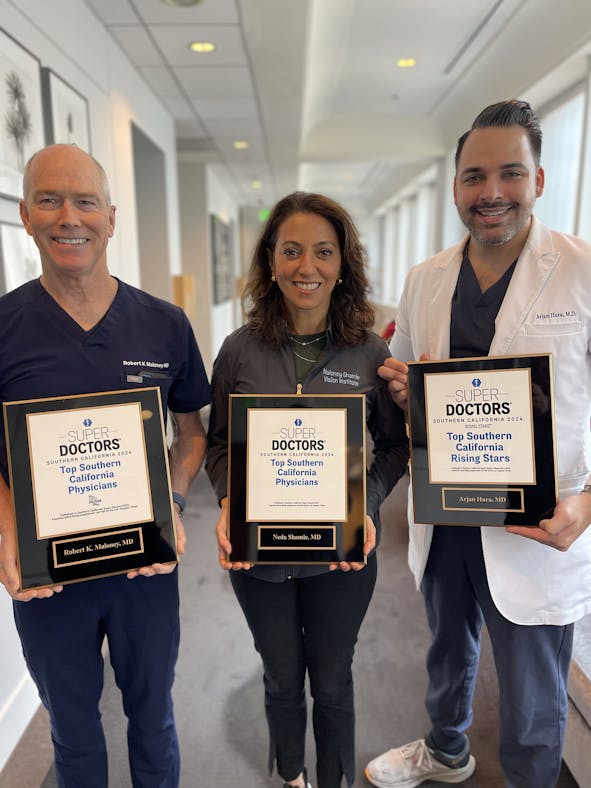The Maloney-Shamie-Hura Vision Institute Is An Authorized FDA Study Center For Vision Correction Technology.
Pasadena Location Now Open
Pasadena Location Now Open
What Is Keratoconus?
How Does It Occur?
How Is It Treated?
How Does Corneal Collagen Cross-Linking Work?
Is Corneal Collagen Cross-linking FDA Approved?
Patients who suffer from keratoconus experience a bulging and protrusion of their cornea in a cone-like shape. This occurs as a result of thinning of the cornea, also called ectasia, and can occur in keratoconus (KC). Altered corneal biomechanics in these conditions not only cause the tissue to protrude at the weakest and thinnest point, but this also significantly decreases the ability to see clearly as the light is bent in a distorted fashion through the irregular cornea.
Ectasia is a result of a genetic predisposition to a weak cornea in combination with environmental factors, the most important of which is eye rubbing. If you have a family history of keratoconus or have been diagnosed with KC, it is very important not to rub your eyes because that can cause further progression of the condition.
In the past, patients suffering from ectasia depended on treatment options such as rigid contact lenses or penetrating corneal transplants. However, these treatment options did not halt the progression of ectasia nor treat the condition at the root cause. The development of corneal collagen cross-linking by German ophthalmologist Theo Seiler 15 years ago, however, does have the potential to treat the underlying weakness of the cornea and stop the disease in its track.
Our corneas naturally contain cross-links between collagen fibers in order to maintain shape and strength. Ectasia is a result of not enough of these cross-links to support the cornea, leading to bulging and protrusion. This innovative procedure utilizes a combination of riboflavin and UV light to create additional cross-links to promote cornea stability and strength. The corneal collagen fibrils are chemically bonded together to halt the thinning process and restore vision acuity. This procedure does not involve surgical incision into the eye or ablation, as it is only minimally invasive. Clinical trials have demonstrated that the strengthening effect may be permanent.
The FDA approved corneal cross-linking for the treatment of keratoconus and ectasia. At the Maloney-Shamie-Hura Vision Institute we have a world renowned corneal expert in Dr. Shamie who specializes in management of Keratoconus and corneal ectasia at every level of severity. She treats patients using the FDA-approved protocol, which is the only approach proven through multi centered and long-standing studies to be effective in halting the disease and potentially reverse the impact on the vision. Dr. Hura also performs collagen cross-linking for patients, helping patients suffering from keratoconus. Any patient diagnosed with keratoconus, especially if younger than 40 years old or with worsening disease, should be seen quickly and considered for collagen cross-linking before the cornea thins to a degree that would make CXL not possible.





© Maloney-Shamie-Hura Vision Institute. All Rights Reserved.
